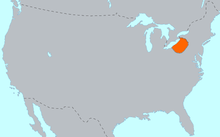Erie language
| Erie | |
|---|---|
| Native to | United States |
| Region | south of Lake Erie |
| Ethnicity | Erie people |
| Extinct | 17th century |
| Language codes | |
| ISO 639-3 |
None (mis) |
Linguist list |
qgl |
| Glottolog |
erie1238[1] |
|
Nation du Chat region | |
Erie was the Iroquoian language of the Erie people, similar to Wyandot.
The names Erie and Eriez are shortened forms of Erielhonan, meaning "long tail", corresponding to the Erie being called the "Cat people" (Nation du Chat; Hodge 1910,[2] Swanton[3]).
At least one loanword survives from the Erie language: Chautauqua, a word of unknown translation.[4]
References
- ↑ Hammarström, Harald; Forkel, Robert; Haspelmath, Martin; Bank, Sebastian, eds. (2016). "Erie". Glottolog 2.7. Jena: Max Planck Institute for the Science of Human History.
- ↑ Erie (Huron: yěñresh, 'it is long-tailed', referring to the eastern puma or panther; Tuscarora, kěn'räks, 'lion', a modern use, Gallicised into Eri and Ri, whence the locatives Eri'e, and Riqué, 'at the place of the panther', are derived. Compare the forms Erieehronon, Eriechronon, and Riquéronon of the Jesuit Relations, signifying 'people of the panther'. It is probable that in Iroquois the puma and the wild-cat originally had generically the same name, and that the defining term has remained as the name of the puma or panther). A populous sedentary Iroquoian tribe, inhabiting in the 17th century the territory extending south from Lake Erie probably to Ohio river, east to the lands of the Conestoga along the east watershed of Allegheny river […] and spoke a language resembling that of the Hurons, although it is not stated which of the four or five Huron dialects, usually called "Wendat " (Wyandot) by themselves, was meant.
Smithsonian Institution Bureau of Ethnology Bulletin #30. - ↑ Erie. Meaning in Iroquois, "long tail," and referring to the panther, from which circumstance they are often referred to as the Cat Nation. The Erie belonged to the Iroquoian language family. Also called: GA-quA'-ga-o-no, by Lewis Henry Morganal (1851)
- ↑ Stories behind names of many familiar places
This article is issued from Wikipedia - version of the 8/23/2016. The text is available under the Creative Commons Attribution/Share Alike but additional terms may apply for the media files.
